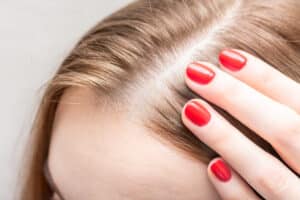
Understanding Alopecia and Its Causes
Alopecia refers to hair loss that can occur due to various factors, including genetics, autoimmune conditions, or lifestyle influences. While there are several types of alopecia, the most common include androgenetic alopecia (pattern hair loss) and alopecia areata, an autoimmune condition where the body mistakenly attacks hair follicles. Though alopecia can affect anyone, certain factors, such as family history or prolonged stress, may increase the likelihood of experiencing hair loss. Taking proactive steps can minimize risk and support hair health. Addressing underlying medical conditions, maintaining a balanced diet rich in essential vitamins and minerals, and reducing stress are essential strategies.
Types of Alopecia
- Androgenetic Alopecia (Male and Female Pattern Baldness): The most common form of alopecia, androgenetic alopecia, is hereditary and influenced by hormonal changes. It typically presents as a receding hairline and thinning crown in men or overall thinning in women.
- Alopecia Areata: This autoimmune condition causes the immune system to attack hair follicles, resulting in patchy hair loss. It can affect people of all ages and is often unpredictable.
- Traction Alopecia: Traction alopecia results from prolonged tension on the hair, often caused by tight hairstyles like braids, ponytails, or extensions.
- Telogen Effluvium: A temporary form of hair loss caused by stress, illness, or hormonal shifts, where a higher percentage of hair enters the shedding phase.
- Scarring Alopecia: Also known as cicatricial alopecia, this condition involves permanent damage to hair follicles due to inflammation or scarring.
Can Alopecia Be Prevented?
While not all types of alopecia can be fully prevented, certain measures can significantly reduce the risk or delay the onset of hair loss. Here’s how:
- Maintain a Healthy Scalp- A healthy scalp is the foundation for healthy hair. Keep your scalp clean and moisturized, and avoid harsh chemical treatments that can damage hair follicles over time.
- Opt for Protective Hairstyles- Avoid tight hairstyles that pull on the hairline or stress the scalp. If you regularly wear braids, ponytails, or extensions, consider loosening them and taking breaks to allow your hair to recover.
- Balance Your Diet- A nutrient-rich diet is crucial for hair health. Foods high in vitamins A, C, D, and E, along with iron, zinc, and biotin, support hair growth. Omega-3 fatty acids found in fish, flaxseeds, and walnuts can also promote a healthy scalp.
- Minimize Stress- Stress is a known trigger for hair loss, especially telogen effluvium and alopecia areata. Practice relaxation techniques like meditation, yoga, or deep breathing exercises to manage stress effectively.
- Avoid Heat and Chemical Damage– Excessive use of heat styling tools, bleaching agents, and other chemical treatments can weaken the hair shaft and contribute to breakage. Use heat protectants and limit these treatments to keep your hair strong.
- Treat Underlying Medical Conditions- Conditions like thyroid disorders, anemia, or lupus can contribute to hair loss. Regular health check-ups and managing chronic conditions can reduce the risk of hair loss.
- Be Gentle With Your Hair- Avoid over-brushing, especially when your hair is wet, as it is more prone to breakage. Use a wide-tooth comb or detangling brush to minimize damage.
- Address Genetic Factors Early- If you have a family history of androgenetic alopecia, consult a dermatologist early. They may recommend treatments like minoxidil, finasteride, or low-level laser therapy (LLLT) to slow the progression of hair loss.
Alopecia cannot be prevented, but treatment can help manage symptoms. For androgenetic alopecia, early intervention is crucial. For autoimmune-related alopecia areata, treatment involves managing overall immune health. Consulting with specialists like Dr. Wang and Dr. Ruff ensures tailored solutions that address specific needs. At West End Hair Restoration, we emphasize a comprehensive approach, from advanced diagnostics to cutting-edge treatments, designed to restore both hair and confidence. This includes NeoGraft Hair Restoration, which is an effective treatment option for slowing the progression of hair loss and restoring hair density. This treatment can help individuals address hair thinning effectively while avoiding the need for harsh chemical treatments or excessive styling that may strain hair follicles. Learn more about this innovative option on our NeoGraft Hair Restoration page.
Start Your Journey to Healthy Hair with West End Hair Restoration
While not all forms of alopecia can be prevented, a combination of healthy habits, proactive care, and medical intervention can reduce your risk and manage the effects of hair loss. At West End Hair Restoration, located in Washington, DC, our team of experts, including double-board certified facial plastic surgeon Dr. Wang and renowned specialist Dr. Ruff, are dedicated to providing personalized care to address hair loss concerns like alopecia. With cutting-edge treatments and a compassionate approach, we offer patients an opportunity to regain control and feel their best. Learn more about alopecia treatments and prevention options on our Alopecia Hair Loss service page.
If you’re experiencing hair loss or seeking expert guidance on alopecia, West End Hair Restoration in Washington, DC, is here to help. Our compassionate team combines medical expertise and individualized care to create treatment plans that meet your unique needs. Call us today at 202-785-4187 to schedule a consultation and take the first step toward restoring your confidence and revitalizing your hair health.
